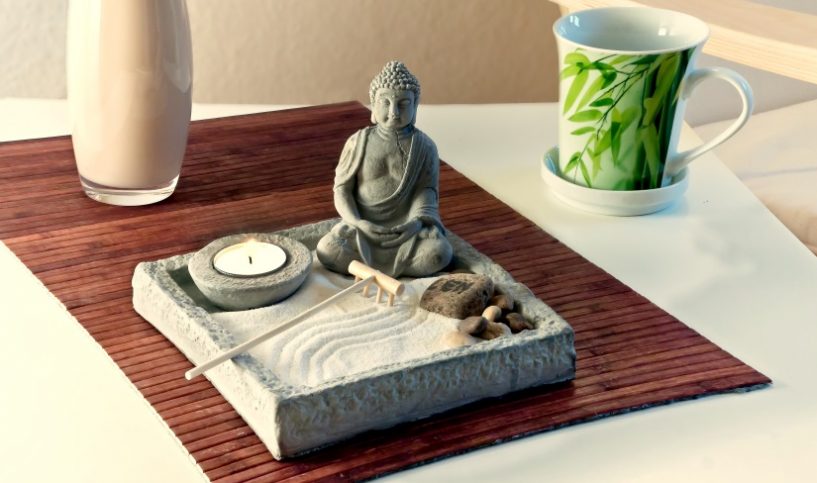A few years ago, I tried yoga. In fact, I tried hot yoga – in this case, Bikram style. It was, well…hot. Really, really hot. I have terrible balance, and more than once, I fell over trying to do one of the pretzellike moves all types of yoga seems to require.
Fortunately for my dignity, it was a beginner’s class and I wasn’t the only one suddenly flinging out a hand in order to avoid bonking some unfortunate body part on the polished wooden floor.
In spite of this rather humiliating proof of my lack of flexibility, I enjoyed the class. The final pose was Savasana, or Corpse Pose. As we’re all laying there in the hot, humid room (I did mention it was hot, right?) the Yogini began to talk about
the practice of meditation.
Since I was trying out yoga as a way to have some mental peace and quiet, I closed my eyes and honed in on her lovely, soft voice, following the instruction to “feel the mat beneath you”, and to “focus on the breath”. I fell asleep. Yes. Right there in that hot, humid room, surrounded by sweaty bodies, I went to sleep.
When people around me began to move, I woke up, and laid there quietly, eyes closed, until the room was empty.
I went to yoga a few more times, enduring the whole class for those last 10 minutes of mental peace and quiet. I didn’t get any better at the poses – I have Multiple Sclerosis and my balance is unfixably sucky – but Savasana? Heaven.
I don’t know about you, but I have a mind that never shuts off. It’s constantly busy and seems to ramp up to light speed as soon as I try to go to sleep. It seems to me that every thought I’ve ever had suddenly needs to be considered right
now. All at once. No matter how tired I am, my wretched mind is determined to solve all of my problems, all at once, immediately.
The benefit of meditation is actually well researched, and most recently, has been the focus of intense investigation with relation to the treatment of Post-Traumatic Stress Disorder (PTSD) and Developmental Trauma or Complex
PTSD. Dr. Matthew Thorpe, writing for the blog Healthline.com reviewed multiple studies on meditation, and offered these three top benefits to a regular meditation practice.
Reduces stress
Too much stress is a very bad thing. (Too little stress is not so good either.) Mental and physical stress increases cortisol, which in turn causes the release of inflammation-producing chemicals called cytokines. What is needed is a way to
reduce stress when necessary.
In other words, take control and manage stress. Meditation can do this.
Controls anxiety
Studies have shown that as little as eight weeks of mindfulness can reduce anxiety, which also reduces stress. Anxiety is the mental habit of imagining a negative event or outcome and experiencing physical symptoms as a consequence. When we are able to quiet our minds, developing a new habit of staying present and connected to NOW, we are able to learn to control and sometimes even eliminate the habit of anxiousness.
Promotes emotional health
Remember those cytokines? These inflammation producing chemicals released as a response to stress are implicated in the development of depression. Meditation reduces stress, decreasing the production of cytokines, elevating
mood and lessening depression. One controlled study compared electrical activity in the brains of people who practiced mindfulness meditation and those who did not. Those who meditated showed increased activity in the areas related to positive thinking and optimism.
Meditation includes a whole gamut of different practices, but all have one commonality – quieting the mind. In looking up meditation, I discovered I could go to an Ashram in India and meditate in complete silence for a whole week (Eek!) or
I could download an app and do a 10-minute guided meditation every day from the comfort of my own sofa, coffee in hand. Guess which form of meditation I practice? (Hint…coffee is involved)
Have you ever wondered about meditation? I mean, deep down where no one can see it, mentally rolled your eyes at the latest Elephant Journal post extolling the virtues of meditation? I know I did …but not anymore.
https://www.instagram.com/p/Bh_9W7igsFL
Developing and maintaining a habit of meditation has long term benefits with potential to increase your quality of life and decrease those nasty feel bad chemicals. My favorite resources for meditating (when I’m not sweating my way through a real yoga class) are all apps. I use Calm (Calm.com), Headspace (Headspace Meditation Limited), Breethe (OMG. I Can Meditate! Inc.), and Relax Meditation (Ipnos Software). All available for iOS and Android. Why not try it for yourself?
Dr Susannah is a leading psychologist, registered professional counsellor and Master Practitioner in Clinical Counseling based in Canada. For more information, please follow @DrSusannah on Twitter and Instagram and stay tuned for her latest updates. Image by PxHere











